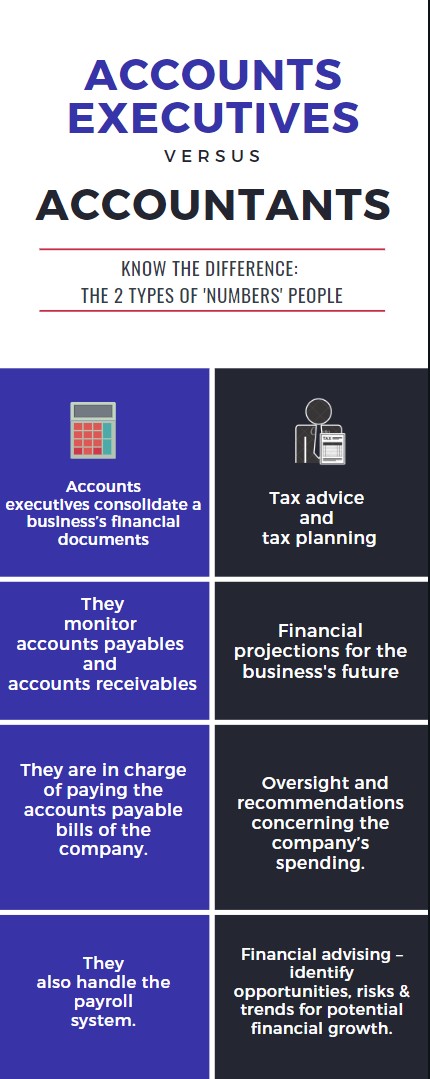
Your Nightmare in Hiring the Wrong Accounts Person
Are You Hiring?
Find candidates in 72 Hours with 5+ million talents in Maukerja Malaysia & Ricebowl using Instant Job Ads.
HIRE NOW
Know the Difference: Accounts Executives vs. Accountants
Often wondered what the difference is between these two roles? Have you ever hired an accountant instead of an accounts executive to oversee your ledgers and payroll — only to realise you have an over-competent financial professional onboard and could do away with all the deep diving into financial analysis and save money?
Here we share with you the distinction between these two almost similar but rather contrasting positions (‘same same, but different’) in accounting, and how you could be saving more if your business is an SME and only requires minimal accounting solutions!
Accounts executives (or sometimes known as accounts payables) and accountants both handle a company’s financial data. Accounts executives make records when a business receives, pays or owes a sum of money. Accountants, in contrast, provide a more in-depth analysis than accounts executives.

Accounts executives
Prior to this, accounts executives merely stored a company’s accounts in a hard-copy ledger. Today, however this has shifted, wherein accounts executives are more likely to utilise software, but the objective ultimately is the same – to keep check of the cashflow moving in and out of the company. Should it be a small business entity, the business owner or founder might be able to manage the work, but accounts executives bring to the table the experience to do it in a more efficient, quicker, meticulous and proper manner.
Accounts executives carry out several functions that are applicable to most types of companies.
They keep a record of sales and purchases.
- Accounts executives consolidate a business’s financial documents — i.e., bank statements.
- They monitor accounts payables and accounts receivables, so the business is aware of how much it owes vendors and suppliers; and how much customers may owe the company.
- They are in charge of paying the accounts payable bills of the company.
- They also handle perform the processing and maintaining of the payroll system.
Accounts executives typically possess some college or below qualification, but not necessarily a degree per se. Some of them may only come with a high-school education even. Their average pay is estimated at around RM 29,335 to RM 33,000 annually. This translates to half of accounts executives earning more, while the other half earning lesser. Thus, more relevant for SMEs (Small-Medium Enterprises).
Accountants
Accountants, on the other hand, usually carry at the least — a bachelor's degree, although not necessarily in accounting. The average salary for an accountant in Malaysia comes at an annual rate of RM 56, 736. A business could be compensating an accountant to manage the ledger, but in fact, it's far more cost-savvy to engage with an accounts executive and hire an accountant for higher-level accounts or financial services.
Should your company be positioned for solid business growth, it makes a lot of sense to bring onboard a financial professional. You’ll have the ease of mind that a qualified professional is always keeping a watchful eye on your company’s digits. This is because accountants are able to review a company’s finances and present to management a big-picture perspective, as we all know that he characteristics of accounting are complex and complicated to grasp for the non-accounting or financial professional. Therefore, a proper accountant can facilitate business with not only tax returns, but with longer-term tax planning, business planning, networking, and even personal tax planning should you still be the major stakeholder in your company. The accounts executive records data; accountants turn it into usable information for business planning.
Accountant duties include:
- Tax advise and tax planning
- Financial projections for the business's future
- Oversight and recommendations concerning the company’s spending.
- Financial advising –they should be able to identify opportunities, risks, and trends for potential financial growth.
- Tax preparation – They’ll need to rightfully pay your company’s taxes on time and maximise deductions all year round.
Accountants may also run through the ledgers maintained by an accounts executive and ensure that the records are accurate.
Now that you are well aware of how the two can serve your business, you can say, Goodbye to overpaying an accountant for meeting your basic financial solutions and hire an accounts executive instead of your budding business…and saving money while at it!
Check out Ricebowl.my today to onboard your quality and quick hiring accounts executive! We’re offering you an RM300 discount on all our packages, only for 10 days. Hurry up! As the offer is only valid from 10 October 2019 to 20th October 2019!

